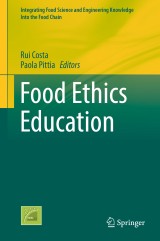Details

Food Ethics Education
Integrating Food Science and Engineering Knowledge Into the Food Chain, Band 13
|
84,99 € |
|
| Verlag: | Springer |
| Format: | |
| Veröffentl.: | 27.10.2017 |
| ISBN/EAN: | 9783319647388 |
| Sprache: | englisch |
Dieses eBook enthält ein Wasserzeichen.
Beschreibungen
<p>The book is divided in 3 sections, each containing several chapters: Section 1 includes chapters that identify and discuss several ethical issues along the food chain, with particular detail of issues in the food industry and in consumer behavior; Section 2 includes chapters that present the basis of a code of conduct in the food profession as well as the description of existing codes of conduct of food industry and food scientist professionals, including ethics of publishing, and also ethics in risk communication; Section 3 includes chapters based on case studies with examples of teaching approaches currently used in teaching food ethics, easy to implement and already tested and confirmed as successful examples that engage students in this topic.</p><p>Although professional ethics in food supply chain is claimed as an essential topic to be addressed in any degree program, few higher education institutions that currently include a module on ethics in their study programs. In g</p>eneral, it is argued that ethics is a topic addressed along the curriculum and embedded in the contents of the modules. However, ethics, for its importance, needs a different teaching and educational approach, and this book achieves that.. <br/><p></p>
<p>Part I Introduction.- Chapter 1Teaching food ethics.- Chapter 2 With a little help from Bioethics.- Part II Food ethics issues.- Chapter 3 Sustainability and ethics along the food supply chain.- Chapter 4 The ethics of consumption.- Chapter 5 Ethical issues in the food industry.- Part III Ethics for food professionals.- Chapter 6 Codes of ethics of food industry professionals: principles and examples.- Chapter 7 Corporate social responsibility.- Chapter 8 Whistleblowing: food safety and fraud.- Chapter 9 Ethical issues in risk communication.- Chapter 10 Publication ethics.- Part IV Food ethics case studies.- Chapter 11 Operation Aberdeen.- Chapter 12 Bushmeat.- Chapter 13 Food labeling case studies.</p><p></p><p></p>
<p><b>Rui Costa</b> is a professor of food engineering at the College of Agriculture of the Polytechnic Institute of Coimbra. He has a first degree and a Ph.D. in Food Engineering from the Catholic University of Portugal. His research interests include transport phenomena in food processing, safety and environmental aspects of food processing, the shelf life of foods, and use of new protein sources in foods. He has a long experience, at international level, in quality assurance of higher education, curriculum development in food studies, regulation of food professions, and the improvement of the links between research-education-industry.</p> <p><b>Paola Pittia</b> is professor in food science and technology at the Faculty of Bioscience and Technology of the University of Teramo. Her research expertise is on food processing and product design as well as on quality and shelf-life of foods. She has a long and internationally recognized experience on Curriculum Development and Quality Assurance in Food studies and innovative teaching materials. She was the coordinator of the Erasmus Thematic Network ISEKI-Food 4 and currently is the President of the ISEKI-Food Association, nonprofit, international organization with activities aimed to strengthen the interactions between education, research and industry. </p><p></p>
<div><p>Although many consider professional ethics in the food supply chain an essential topic that should be covered in any degree program, few higher education institutions currently include a module on ethics in their study programs. Instead, ethics is taught in tandem to the core curriculum and is often embedded in the contents of other modules rather than treated as a subject in its own right. Ethics, however, is important enough to warrant a different teaching and educational approach. This book provides support for development of a course in ethics for food studies education.</p><p></p><p>The book is divided into 3 sections, each containing several chapters: Section 1 includes chapters that identify and discuss several ethical issues along the food chain, with particular attention given to issues in the food industry and in consumer behavior; Section 2 includes chapters that present the basis of a code of conduct in the food profession, as well as descriptions of existing codesof conduct for food industry and food scientist professionals. These include codes for the ethics of publishing, and also ethics in risk communication; Section 3 includes chapters based on case studies with examples of teaching approaches currently used in teaching food ethics. These approaches are easy to implement and have already been tested and confirmed as successful examples that engage students in this topic.</p></div><p></p>
Serves as a training tool or support for course development Written by an interdisciplinary team of experts Includes case studies on ethical issues
<div><p>Serves as a training tool or support for course development</p> <p>Written by an interdisciplinary team of experts</p> <p>Includes case studies on ethical issues</p></div>

















